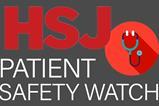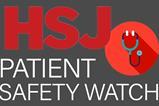HSJ hosts the Patient Safety Watch newsletter, written by Patient Safety Watch chief executive James Titcombe.
Good afternoon and welcome to the latest edition of the Patient Safety Watch newsletter.
New health secretary brands NHS ‘broken’
Newly appointed health secretary Wes Streeting used his first official statement to declare the policy of the Department of Health and Social Care “is that the NHS is broken”.
He said: “When we said during the election campaign that the NHS was going through the biggest crisis in its history, we meant it.”
My view? It’s welcome to hear a politician speak so candidly about the state of the NHS. There will be debate about the exact phrase used, but – semantics aside – there is plenty of evidence (often covered in this newsletter) supporting the view that, in many areas, NHS performance is declining, and patients and staff are suffering the consequences. A bold statement setting out the need and urgency for change is welcome.
In the past, I think it’s also fair to say NHS performance has sometimes been used as a political football; let’s hope those days are gone and this level of candour becomes the new norm – consistently and at all stages of the political cycle.
Former King’s Fund director to lead new 10-year health plan
Director of policy at the King’s Fund Sally Warren is taking up a senior role in the DHSC to lead the development of a 10-year health plan. I’ve been lucky enough to work with Sally in former roles and more recently as fellow commissioners for The Times Health Commission.
Sally is a brilliant thinker and well respected for her knowledge, insight and record for talking sense. By all accounts, the perfect person to lead this important work. We wish her all the best in her new role.
Professor Lord Darzi appointed to establish the state of the nation’s health service
The final big policy announcement this fortnight is that Lord Darzi has been appointed to lead a full and independent investigation into the state of the NHS, to “uncover the extent of the issues facing the nation’s health service”.
DHSC’s announcement said the report will be a “raw and honest assessment” of the issues the NHS faces. Lord Darzi is expected to report back in September.
Speaking to the BBC about the investigation, Mr Streeting said he has been “genuinely stunned” by the NHS failings he has heard about since becoming health and social care secretary, adding much of what he had been told is not in the public domain and there was “worse to come”.
In other news this edition…
Dysfunctionality ‘at virtually every level’ at regulator
An independent review into culture at the Nursing and Midwifery Council has found instances of racism, bullying and discrimination, along with dysfunctionality “at virtually every level and across all directorates” and a “fundamental disconnect between what the NMC embraces and what it practises”.
The authors of the review, which the NMC commissioned after a whistleblower raised concerns over a “deep-seated toxic culture”, also saw staff “break down in tears as they recounted their frustrations over safeguarding decisions that put the public at risk”.
Former NMC chief executive Andrea Sutcliffe, who stepped down earlier this month for health reasons, said in a statement she was “devastated this has happened on my watch and I apologise to everyone affected, our colleagues, professionals on our register, and the public”.
The report makes for disappointing and alarming reading. The NMC went through a period of significant leadership change in 2019, following a damning report by the Professional Standards Agency into its handling of cases relating to Morecambe Bay. My view is there have been positive changes since (I personally rate Andrea as one of the best, values-focused leaders I’ve come across), but clearly deep-rooted cultural issues persist and urgent action is needed.
What next for the NMC? As well as addressing the serious issues the report identified, does the framework of professional regulation itself need reform? I’d like to see a shift towards system thinking alongside greater use of restorative processes for the majority of cases referred. This would allow a much sharper focus and swifter action to be taken in cases of serious malpractice where public protection is paramount.
‘Alarming’ number of GPs feel workload threatens patient safety
A survey by the Royal College of GPs has found more than three-quarters (76 per cent) of GPs think patient safety is at risk because of their excessive workloads.
The survey of more than 2,000 GPs also found 60 per cent feel they do not have enough time to adequately assess and treat patients during appointments.
RCGP chair Kamila Hawthorne said: “Our number one priority is the safety of our patients, and it is alarming to hear how many GPs feel this is being compromised by the immense workload pressures they are working under. The fact that so many of our members say they’re not able to provide the high-quality, safe care their patients deserve shows that it is patients who are bearing the brunt of the crisis in general practice.”
Ockenden warns Nottingham’s maternity ‘improvements have stalled’
According to BBC News, Donna Ockenden, the senior midwife leading the ongoing inquiry into maternity services at Nottingham University Hospitals Trust, has said more work is needed to “get back on track” after receiving recent reports of poor standards from concerned families.
Ms Ockenden’s comments come shortly after it came to light the Care Quality Commission had carried out an unannounced inspection at the trust’s Queen’s Medical Centre and City Hospital in June.
NHS patients raising safety concerns too often ‘fobbed off’, says commissioner
NHS patients raising safety concerns are too often “gaslighted”, “fobbed off” or dismissed as “difficult women”, England’s patient safety commissioner has warned.
Speaking to the British Medical Journal, Henrietta Hughes criticised health leadership for a “relentless focus” on finance and productivity, adding that, at a provider level, this risked a “toxic” culture where “we’re just on the road back to the Mid Staffs scandal”.
Reflecting on the challenges of her role, Dr Hughes said she was “swimming against the tide” when it comes to making a lasting cultural change, adding: “People are quite comfortable with the way they do things already.”
Nursing shortage both ‘dangerous’ and ‘demoralising’
The latest findings from the Royal College of Nursing’s Last Shift Survey showed only a third of shifts have enough nurses, while 80 per cent of those surveyed said there were insufficient numbers of nurses to keep patients safe.
Off the back of the survey, which asked more than 11,000 union members about their last shift, the RCN is calling for minimum safe staffing levels to be enshrined in law.
RCN general secretary and chief executive Nicola Ranger said: “Without safety-critical limits on the maximum number of patients they can care for, nurses are being made responsible for dozens at a time, often with complex needs. It is dangerous to patients and demoralising for nursing staff.”
Sharing some good stuff…
PSIRF learning response tools: Introducing a new AAR report template – webinar
NHS England is hosting a free online webinar on 18 July from 12:30pm to 2pm focusing on the after action review methodology.
Presenters include NHSE’s Tracey Herlihey, the Health Services Safety Investigations Body’s Melanie Ottewill and AAR expert Judy Walker.
Anyone can attend and registration is open until noon on 16 July.
Maternity and neonatal independent senior advocate evaluation workshop
The Nuffield Trust is running an independent evaluation of the pilot of the maternity and neonatal independent senior advocate role, which was introduced to make sure women and families who have experienced serious, poor outcomes in their maternity and neonatal care were heard.
As part of the evaluation, the Nuffield Trust is looking for people with lived experience of adverse outcomes and/or complaints/investigation procedures in their maternity and neonatal care in the last 10 years to attend a workshop on 22 July. More details are available here.
Research corner
Two recently published papers to quickly mention.
First, an insightful and timely piece looking at the enablers and barriers to implementing a patient-led escalation system, published in the BMJ. The paper highlights infrastructural and leadership support’s importance when implementing patient-led escalation systems and normalising the everyday process of involving patients and families in escalation.
Second, an important paper in the Journal of Patient Safety, which examined 126 action plans created off the back of hospital serious incident investigation reports across three years and compared them with the risk controls proposed. The researchers found 15 per cent of factors investigation reports identified as contributing to serious incidents were not addressed by identifiable risk controls while 74 per cent of the 822 proposed risk controls in action plans were assessed as weak.
Countdown to Congress!
This year’s HSJ Congress – focused on “Honest Conversations: Creating Safety in a System Under Pressure” and chaired by Sunday Times health editor Shaun Lintern – is edging closer. The two-day event starts on 16 September in Manchester, and includes a wide range of topics covering 11 content streams.
In keeping with this week’s newsletter, you can hear more from the RCN’s Professor Ranger on navigating implementing safety in a system under extreme pressure, and what’s really needed.
You’ll also hear from NHS Wales chief nursing officer Sue Tranka, who will be speaking in a session about how Martha’s rule is being embedded to help achieve patient safety and the lessons learned so far.
Want to explore more conversations on patient safety? Check out the Patient Safety Congress and book today.
That’s all for a busier-than-normal edition of the newsletter, but a few final thoughts before signing off.
Recent developments highlight a critical juncture for the NHS, with an unequivocal message from the top signalling urgent reform and change are on the horizon. As new leaders step forward to address the challenges, they must also remember the lessons from major periods of NHS reform in the past. Well-intended major policy changes (think foundation trusts, waiting time targets, etc.) in a service as complex as the NHS can have harmful unintended consequences.
One of the crucial lessons from the past, as highlighted by the Patients Association, is that policy reform must be done in partnership with patients. Listening to the experience and voice of patients shouldn’t be a one-off consultation or event – it should be built into every part of the NHS, including its leadership and regulatory system, and in real-time. If there is a willingness to listen, patients’ voices are already shining a clear light on where the biggest problems lie and what the solutions could be.
Please look out for our next newsletter in two weeks. Thanks for reading and stay safe.
James Titcombe
































No comments yet